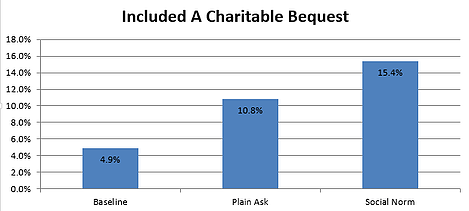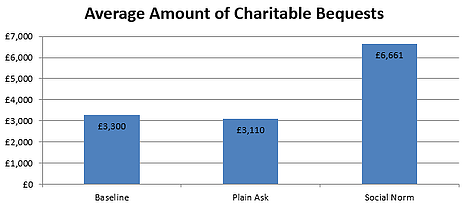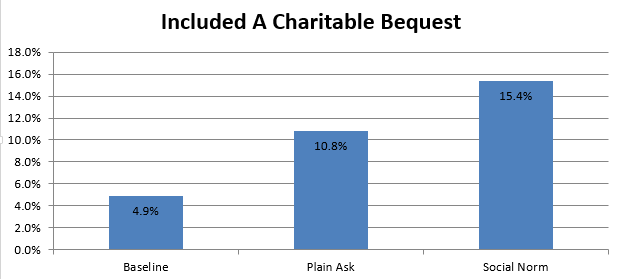The Power of Suggestion
PG Calc was thrilled to have Russell James, Professor of Personal Finance at Texas Tech University, as a recent guest presenter in our monthly Webinar series. During his August 28 session, Prof. James discussed fascinating results from his survey of over 5,000 subjects. The survey tested reactions to different descriptions of specific gift plans. His conclusion: The words we use to describe planned gifts and their benefits matter. In particular, “family” words, such as “make a gift,” triggered a more positive response from participants than formal words, such as “make a transfer of assets.” Prof. James buttressed his survey findings with theoretical research performed by him and others, showing that there is neurological, biochemical, and demographic evidence that corroborate his survey results.
Study shows a social norm message increases bequests dramatically
In addition to focusing on the importance of terminology, Prof. James noted that giving to charity is a social act and that fundraisers would do well to reflect this fact in their marketing materials and conversations with donors. He cited an extraordinary study performed by the Behavioral Insights Team, a government office in England, that drives this point home and that is worth recounting in some detail.
The Behavioral Insights Team had Co-Operative Legal Services, an organization that helps British citizens draft their wills over the phone, divide 3,000 clients into three equal groups. Will-writers in the Baseline group were not asked whether they wanted to donate money to charity. Will-writers in the Plain Ask group were asked, “Would you like to leave any money to charity in your will?” Will-writers in the Social Norm group were asked, “Many of our customers like to leave money to charity in their will. Are there any causes you’re passionate about?” In all cases, the question about charity was one of many questions asked.
The results were remarkable. The graph below shows that the percentage of will-writers in the Plain Ask group who included a gift to charity in their will more than doubled versus the Baseline group. What’s more, the percentage of will-writers in the Social Norm group who included a gift to charity in their will more than tripled versus the Baseline group. Merely mentioning a gift to charity led to a huge increase in the number of charitable bequests. Mentioning a gift to charity along with a message that others do this roughly doubled the positive effect of mentioning a charitable gift. Wow!
This next graph shows that including a social norm message didn’t just prompt more will-writers to give to charity. It also lead to a substantial increase in how much they gave. While the Plain Ask group, on average, left about the same amount to charity as the Baseline group, the Social Norm group left an average of twice as much to charity.

Including a social norm message tripled the fraction of will-writers who included charity in their will and doubled the average amount they gave. Multiply these two effects together and you find that including the social norm message increased the amount going to charity six-fold! Even allowing for a generous margin of error, these are amazing results. What makes them even more compelling is that they are based on participants who actually included charitable bequests in their wills, not on participants who said that they would.
Want to learn more?
A report on the will-writing study and other studies of charitable giving behavior conducted by the Behavioral Insights Team is available online. If you would like to watch Prof. James’ PG Calc Webinar, it is available for purchase (all PG Calc Webinar recordings include an accompanying paper and a PDF of the slides).



Submit a Comment